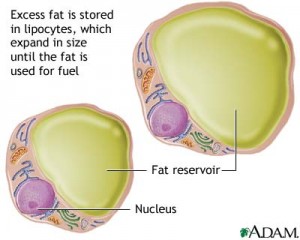Three kinds of fat, only one is making you gain weight…
 We all wonder and question why am I fat and why do I have such a hard time losing weight. After reading Dr. Simeons Pounds and Inches I learned many things about how our bodies store fat and why some are more prone to it than others. Learning the mechanics will help you understand the battle you are in to lose weight and keep it off. Read the following section on the three kinds of fats from Pounds and Inches.
We all wonder and question why am I fat and why do I have such a hard time losing weight. After reading Dr. Simeons Pounds and Inches I learned many things about how our bodies store fat and why some are more prone to it than others. Learning the mechanics will help you understand the battle you are in to lose weight and keep it off. Read the following section on the three kinds of fats from Pounds and Inches.
Three Kinds of Fat
In the human body we can distinguish three kinds of fat. The first is the structural fat which fills the gaps between various organs, a sort of packing material. Structural fat also performs such important functions as bedding the kidneys in soft elastic tissue, protecting the coronary arteries and keeping the skin smooth and taut, it also provides the springy cushion of hard fat under the bones of the feet, without which we would be unable to walk.
The second type of fat is a normal reserve of fuel upon which the body can freely draw when the nutritional income from the intestinal tract is insufficient to meet the demand. Such normal reserves are localized all over the body. Fat is a substance which packs the highest caloric value into the smallest space so that normal reserves of fuel for muscular activity and the maintenance of body temperature can be most economically stored in this form. Both these types of fat, structural and reserve, are normal, and even if the body stocks them to capacity this can never be called obesity.
But there is a third type of fat which is entirely abnormal. It is the accumulation of such fat, and of such fat only, from which the overweight patient suffers. This abnormal fat is also a potential reserve of fuel, but unlike the normal reserves it is not available to the body in a nutritional emergency. It is, so to speak, locked away in a fixed deposit and is not kept in a current account, as are the normal reserves.
When an obese patient tries to reduce by starving himself, he will first lose his normal fat reserves. When these are exhausted he begins to burn up structural fat, and only as a last resort will the body yield its abnormal
reserves, though by that time the patient usually feels so weak and hungry that the diet is abandoned. It is just for this reason that obese patients complain that when they diet they lose the wrong fat. They feel famished and tired and their face becomes drawn and haggard, but their belly, hips, thighs and upper arms show little improvement. The fat they have come to detest stays on and the fat they need to cover their bones gets less and less. Their skin wrinkles and they look old and miserable. And that is one of the most frustrating and depressing experiences a human being can have.
Injustice to the Obese
When then obese patients are accused of cheating, gluttony, lack of will power, greed and sexual complexes, the strong become indignant and decide that modern medicine is a fraud and its representatives fools, while the weak just give up the struggle in despair. In either case the result is the same a further gain in weight, resignation to an abominable fate and the resolution at least to live tolerably the short span allotted to them-a fig for doctors and insurance companies.
Obese patients only feel physically well as long as they are stationary or gaining weight. They may feel guilty, owing to the lethargy and indolence always associated with obesity. They may feel ashamed of what they have been led to believe is a lack of control. They may feel horrified by the appearance of their nude body and the tightness of their clothes. But they have a primitive feeling of animal content which turns to misery and suffering as soon as they make a resolute attempt to reduce. For this there are sound reasons.
In the first place, more caloric energy is required to keep a large body at a certain temperature than to heat a small body Secondly the muscular effort of moving a heavy body is greater than in the case of a light body. The muscular effort consumes Calories which must be provided by food. Thus, all other factors being equal, a fat person requires more food than a lean one. One might therefore reason that if a fat person eats only the additional food his body requires he should be able to keep his weight stationary. Yet every physician who has studied obese patients under rigorously controlled conditions knows that this is not true. Many obese patients actually gain weight on a diet which is calorically deficient for their basic needs. There must thus be some other mechanism at work.
